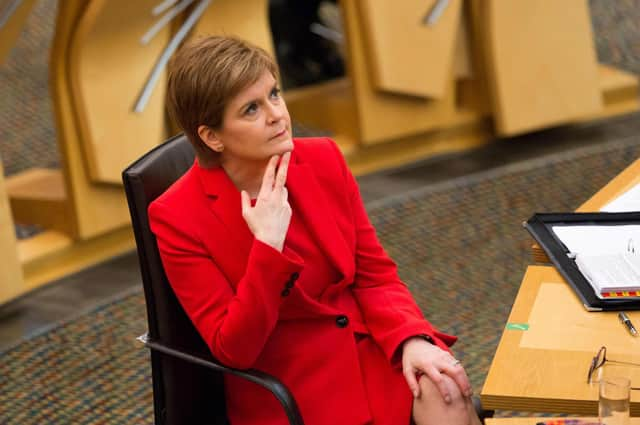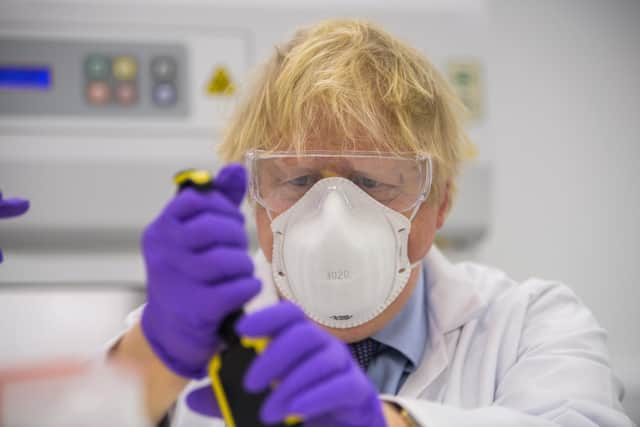Scottish independence campaign must overcome serious obstacles if it is to win decisive support – Joyce McMillan


In truth, though, most of the First Minister’s current political problems do not emanate from the panic in the breastie of the PM, which so far has resulted only in the setting up of a committee to save the Union chaired by Michael Gove, and in his ill-advised decision to visit Scotland in the middle of a pandemic which involves fierce travel restrictions.
No, the panic that is causing difficulties for Nicola Sturgeon lies mainly in the bosoms of a small but eloquent cohort of long-time independence supporters who – confronted for the first time in their lives by a sequence of 20 polls all signalling majority support for independence – have reacted with a kind of visceral terror that Scotland will one again snatch defeat from the jaws of victory, by failing to seize this moment.
Advertisement
Hide AdAdvertisement
Hide AdConspiracy theories have even emerged suggesting that Nicola Sturgeon is a unionist plant, put in place to prevent independence from happening; and even among those independence supporters able to keep the wilder online theories at bay, there is a widespread panicky feeling that given the depth of the Covid and Brexit disasters besieging the British state, Scotland now needs to do something decisive to effect its escape, or go down with the sinking British ship.
Seductive though such metaphors are, though, the moment in which Scotland’s independence campaign finds itself is far more nuanced than most in the “action now” camp are prepared to concede; and if we draw the camera back a little from the drama of the Brexit-Covid crisis, and the unlovely form of unionism embraced by the Johnson government, it’s easy to see that while support for independence is clearly growing in Scotland, it is not yet at the point where it can accurately be portrayed as the “settled will” of the Scottish people, and certainly not at the point where any wise First Minister could risk either a declaration of independence, or an advisory referendum that would be perfectly legal, but would doubtless be boycotted by the unionist camp.
On the contrary, any sober assessment of current Scottish politics demonstrates that the process of winning decisive support for independence still has some way to run, with some serious obstacles to be negotiated over the next few years.
The most obvious obstacle is the fact that after 14 years in government, the SNP is tired, and – in normal circumstances – would be overdue for some time in opposition. The grumbling ulcer of the Salmond affair may, in the end, turn out to be less damaging to the First Minister’s personal reputation than some Salmond supporters hope; but it is only the tip of the kind of iceberg of complaint about abuse of power, serial incompetence, incipient corruption and general arrogance that tends to haunt every government after a long period in office.


There is no guarantee, given the media climate at UK level, that some or all of these allegations may not begin to erode support for the SNP, over the coming months; and while Nicola Sturgeon is a formidable leader, supporters of independence should not fall into the trap of imagining that the cause could not survive her departure, or re-emerge stronger after another electoral cycle of change and renewal.
Then secondly, independence supporters should remind themselves of the general rule that support for Scottish home rule tends to expand in time of economic prosperity and confidence, and dwindle in times of hardship, when people feel more vulnerable to the argument that Scotland cannot afford the risks of separation.
By any measure, the next half-decade is likely to be a period of real difficulty for many sectors of Scotland’s economy; and many voters will find themselves caught between anger at the Westminster follies that have inflicted so much damage, and genuine fear of the consequences of initiating yet more disruption, in such troubled times.
In the end, of course, this Catch-22 of an argument cuts both ways. Tories in Scotland and beyond are already perilously close to arguing that, given the Brexit-related mess they have created, compounded by poor handling of the Covid epidemic, Scotland had better not attempt further change for fear of making things even worse; and to say that that is not an inspiring argument, or one likely to win hearts and minds in the long term, is to understate the case.
Advertisement
Hide AdAdvertisement
Hide AdFor the vast majority of Scots after all – now and throughout the history of the Union – our political arrangements on these islands have been judged not by emotive rhetoric about sovereignty either Scottish or British, but by their effectiveness in providing the security, support, and opportunity people need, in order to lead decent and productive lives.
It is because the UK has so clearly failed that test, in relation to Brexit – wilfully damaging its own economy, and stripping 66 million people of rights and opportunities they had come to take for granted – that support for independence now stands at a historic high.
And so long as the government at Westminster continues to follow its present path, independence supporters have nothing to fear from the unfolding of history over the next half-decade – and everything to gain from the steady emergence of the substantial base of majority support Scotland will need, if it is to win the prize of a peaceful and internationally recognised emergence onto the world stage, as a nation and state in its own right.
A message from the Editor:
Thank you for reading this article. We're more reliant on your support than ever as the shift in consumer habits brought about by coronavirus impacts our advertisers.
If you haven't already, please consider supporting our trusted, fact-checked journalism by taking out a digital subscription.
Comments
Want to join the conversation? Please or to comment on this article.
